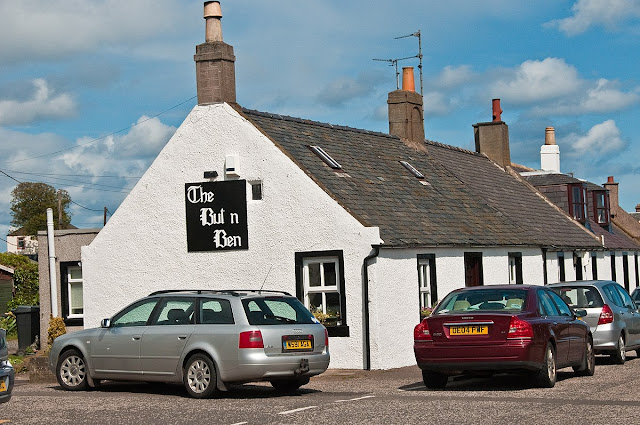Get the Word! Podcast Episode: Have You Been ben the Ben of a But 'n' Ben?
Audio Transcript:
Hello everyone. It’s Mike, your host of Get the Word! an etymology podcast for word nerds. I’m also an ESL teacher. I guide people through their journey of learning the English language. On a regular basis, I end up being the one learning new words from my students. Today’s word for our podcast episode is one of those words that I learned from a student of mine. Ben. No, I’m not talking about the biblical name, short for Benjamin, nor am I talking about the way I, and some other people, pronounce the past participle form of the verb ‘to be’. Hey, I can’t help my accent — clip —
Nope, I’m actually talking about the word ‘ben’ B-E-N, lowercase, the only lowercase entries in both Oxford and Merriam Webster relate to several words and definitions, all labeled as Scottish English. Let’s look at the definitions and then get down to the bottom of this, shall we?
Let’s start with Oxford, two separate entries both labeled Scottish both with an origin dating to the late 18th century. First, ‘ben’ a high mountain or mountain peak, as in Ben Nevis, which is the highest mountain in Scotland.
The second ‘ben’ refers to the inner room in a two roomed cottage. As in, “… I’ll go sleep in the ben”.
So, the first definition, ‘ben’ as a high mountain or mountain peak, can be traced to a Gaelic word, which I’ve heard pronounced as ‘beinn (bane)’ b—ei-n-n. One source gives a very specific date of 1788 for entry into the English lexicon. Now, without any other information given as to why this specific date, 1788, is referenced, I can then only speculate and therefore won’t even bother.
However, our second definition, of ‘ben’ to describe the inner room in a two roomed cottage is most certainly related to the third definition of ‘ben’ that we can find in the Merriam Webster dictionary, which is a synonym for ‘within’ listed both as an adverb and preposition, which could lead to silly sounding sentences such as ‘I am ben the ben’ (I am within the inner room of a 2 room cottage).
Alongside ‘within’ I’ve also dug up ‘inside’ as a synonym for this ‘ben’. So ‘within’ or ‘inside’. This ben is a dialect variant of the Middle English ‘binne’ which is roughly the same as ‘within’ or ‘inside’ in modern English. Now let’s have some fun with language, remember how I said this ties to our inner room of the simple two roomed cottage? So, we have ‘ben’ because it is the inner room of the cottage, ‘ben’ being another word for inside or within.
Well, any guesses on what the Scots sometimes call the outer room of these small cottages? B-U-T but! A but! For anyone who’s been through Scotland or is from Scotland, you may have seen a sign for a but ’n ben, this type of small cottage.
For you see, ‘but’ the popular conjunction we use today has ITS origin in an Old English word that would now, in modern English, be closer to the use of the words ‘outside’ or ‘without’.
Now you know, “but ’n ben” comes from two words that can also mean inside and outside, so you have the inside room and the outside room together, to form a “but ’n ben”.
Shout out to the But’n’Ben Restaurant between Dundee and Aberdeen, serving seafood on the eastern shores of Scotland… and High Tea on Sundays!
An entry listed as ‘archaic’ in Oxford gives us a definition of ‘but’ defined as ‘without’, the example given being this phrase “it never rains but it pours”, in other words, “it never rains without it being the case that it pours”.
After the break, we’ll open up the fact cabinet. Stay with us.
— Break —
— Fact Cabinet —
That sound means we’re entering my but ’n’ ben, which is where I keep my fact cabinet. Here’s my copy of the first ever Broons comic strip, dated March 8th, 1936, which appeared in the Sunday Post in Dundee, Scotland. It features a family named The Broons, and often centers around misunderstandings related to the family’s Scottish accents. Whenever there is a non-Scottish character, the family is addressed as The Browns. The comic still runs every week in the Sunday Post. The Broons have a cottage up in the hills as a holiday home that they refer to as a “but an’ ben”. One source online, World Wide Words (.org) boldly claim that the survival of this term, the ol but ’n ben, can be placed squarely on this long running comic strip in the Sunday Post.
Here’s an item from the fact cabinet, which is not too exciting, but will serve me well, it’s a plug adaptor to convert a US plug into a UK plug to fit in UK outlets. You see, my partner and I are headed to Scotland in November to track down her family heritage. Shout out to the MacNeil clan of the Isle of Barra. Reach out to the podcast if you have any suggestions or tips for our trip through Ireland and Scotland.
Anyway, have you ever wondered why we don’t just have a standard voltage around the world? For example, the standard outlet in the US delivers 110 / 120 volts, but a good chunk of the rest of the world, including the UK, has a 220 / 240 volt system. You see, the US was ahead of the game in putting electricity to practical use back in the day. In the early days of electricity in the US, the lower voltage seemed like the most practical for electric lights, as higher voltages were burning out light bulbs quickly. Therefore, hundreds of power plants in the USA in the early days of electricity adopted 110 / 120 volts as the standard. As time passed, and other parts of the world started to become just as connected as the US on an electric grid, engineers started figuring out how to make 220 volt bulbs that wouldn’t burn out so quickly. Also, a 220 volt system is going to be more efficient. A higher voltage leads to a lower level of current required to produce the same amount of power as 110. The US has stuck with the 110/120v system over the years though, partly because we had so much money and infrastructure already invested in a 110 volt system. But, since many other parts of the world didn’t have so much time and energy invested in a 110/120v system, they decided to just go ahead with, or update to, a 220 to 240 volt system. In many homes throughout the US today, however, you can find one or two 220v outlets to power large devices like dryers and electric stoves.
AUDIO:
Show Notes:
https://www.yourdictionary.com/ben
https://www.merriam-webster.com/dictionary/ben
http://mylanguages.org/scottish_prepositions.php
https://upload.wikimedia.org/wikipedia/commons/thumb/1/1f/The_But_n_Ben%2C_1_Auchmithie.jpg/1200px-The_But_n_Ben%2C_1_Auchmithie.jpg
https://speedyelectricac.com/whats-the-difference-between-110v-and-220v/
https://www.facebook.com/TheButnBenAuchmithie/
https://web.archive.org/web/20110515030013/http://www.thatsbraw.co.uk/The%20Broons/Broons-Page.htm
https://electronics360.globalspec.com/article/10511/how-the-u-s-came-to-adapt-120v-while-others-are-using-230v
https://www.straightdope.com/21342179/how-come-the-u-s-uses-120-volt-electricity-not-240-like-the-rest-of-the-world
http://www.worldwidewords.org/qa/qa-but5.htm
https://dictionary.cambridge.org/dictionary/english/but-and-ben
https://www.etymonline.com/word/ben
Every episode:
Music performed by Monroeville Music Center: https://monroevillemusiccenter.bandcamp.com/track/the-perfect-planet
And Kevin Macleod https://freemusicarchive.org/music/Kevin_MacLeod/Jazz_Sampler/Faster_Does_It_1271
Artwork for Get the Word! created by Bruno Sanches: https://brunofsanches.myportfolio.com/
AUDIO:



Super interesting topic and well-produced podcast and episode. Thanks Mike!
ReplyDeleteMuch appreciated, Christian. Thank you!
Delete